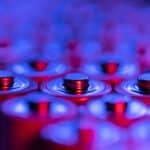
MENUMENU
TALK TO AN EXPERT
Special Hours: 7AM – 6PM PST
TALK TO AN EXPERT
Special Hours: 7AM – 6PM PST
DC-to-DC (DC-DC) power converters are specialized electromechanical units used to recharge batteries. They regulate the electrical current flowing between a charging source and a lithium battery, managing the charging process and preventing overcharging and overheating.
With multiple common use cases, DC-DC power converters are essential in situations where the charging unit’s power supply may not match the lithium battery’s voltage specifications. This lithium battery optimization guide explores major power converter benefits and applications—and explains the key differentiating features of the main types of DC-DC converters on the market.
With respect to lithium batteries, DC-DC converters fulfill four main functions:
Power converters have extensive applications in solar power and energy storage systems, telecommunications, and power systems for spacecraft. Among other applications, consumers can also use them to charge portable electronic devices, drones, and remote-controlled vehicles.
In simple terms, DC-DC power converters use a three-step process to optimize lithium battery charging. The first step, known as bulk, involves adjusting the current of the input source and using the optimized current to charge a lithium battery to near capacity. Absorption, the second step, reduces and stabilizes the incoming power flow to prevent the lithium battery from overcharging. During the final step—the float—the lithium battery safely reaches full capacity.
By matching voltage levels between lithium batteries and the devices they power, converters facilitate safety while optimizing performance and battery health. Lithium batteries only operate safely within specific voltage ranges, and powering devices outside their range specifications may lead to undercharging, overcharging, and/or overheating. Additional power converter benefits include compatibility and efficiency, as they allow users to seamlessly integrate various devices with power sources while minimizing energy losses.
But the consequences of not using DC-DC converters in devices powered by lithium batteries extend beyond potentially serious safety hazards, including:
Converters, therefore, help control costs by extending the lifespan of lithium batteries, maximizing their functional efficiency, and preventing damage that could necessitate expensive battery replacements.
Typical use cases involve three main types of DC-DC power converters. Each converter type is specially designed to manage voltage conversions in specific ways.
Buck converters, also known as choppers or step-down converters, reduce higher input voltages to lower output voltages. Commonly deployed in situations where output voltages need to be lower than input voltages, some specific applications include:
Buck converters are highly efficient at minimizing power losses, stabilizing output voltages, and reducing heat dissipation.
Alternately known as step-up converters, boost converters are the functional opposite of buck converters. Boost converters convert lower input voltages to higher output voltages, and are usually used to:
Like buck converters, boost converters excel at reducing power losses during the conversion process. They are also compatible with a wide range of input voltages, making them highly versatile.
Buck-boost converters can adjust input voltages to higher or lower output voltages. Because they perform both functions, they are also known as universal DC-DC power converters.
Universal converters are ideal for situations with variable input voltages but specific output voltage requirements. Their versatility and broad utility make them essential equipment for achieving output voltage stability when input voltages vary or fluctuate.
A power converter facilitates lithium battery optimization by safely managing the voltage sensitivities of lithium batteries, preserving their capacities, and increasing their energy efficiency. DC-DC power converters specifically extend battery lifespan and performance efficiencies by:
The precision voltage control delivered by DC-DC power converters facilitate safer, more efficient charging and battery operation, which in turn reduces costs while improving reliability.
Battle Born Batteries stocks a complete selection of DC-DC chargers and power converters. Customers can shop for buck, boost, and buck-boost converters, and for isolated and non-isolated systems. Battle Born Batteries also provides expert advice to shoppers unsure of what type of power converter best meets their needs, and to customers with specific questions about the technical features and specifications of the power converters in our lineup.
Notably, DC-DC converters are sometimes prone to what is known as “chaotic behavior.” This phenomenon describes situations in which a system’s output voltage becomes randomly prone to significant and unpredictable fluctuations. Careful, expert-informed selection of battery and charging components can help users reduce the likelihood of chaotic behavior and mitigate its potential impacts. Battery Born Batteries’ in-house experts will be happy to guide you if chaotic behavior is a potential concern in your intended application.
Power converters play a critical role in adapting and stabilizing input and output voltage requirements as necessitated by specific applications. They also help users optimize the efficiency and performance of their power systems, reducing costs and improving both stability and reliability. Importantly, power converters also introduce important safeguards against potentially critical hazards including overcharging, overheating, leakage, and battery explosions.
Battle Born Batteries carries a complete selection of top-performing products, along with reliable and trustworthy expert advice. Visit Battle Born Batteries to browse our selection of power converters, or get in touch if you have any questions.
Shop Best Sellers








Ask a technical specialist now at 855.292.2831
Stay in the Know